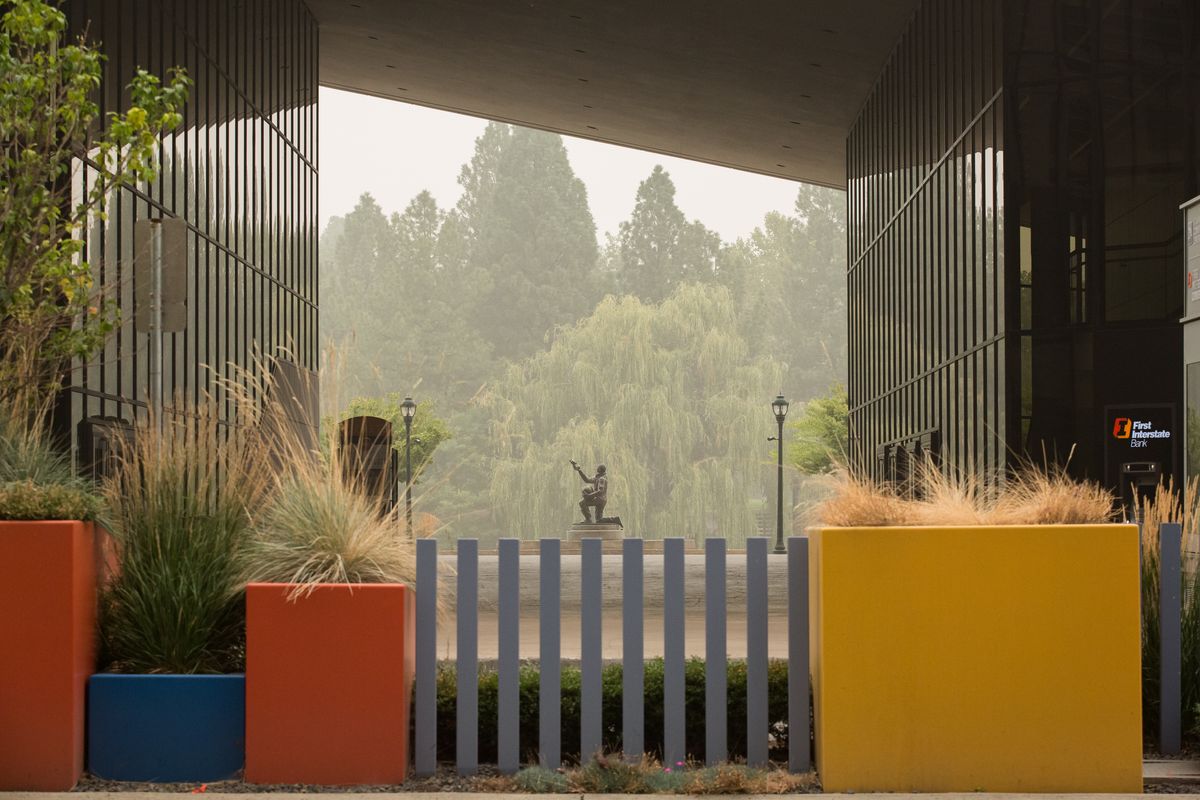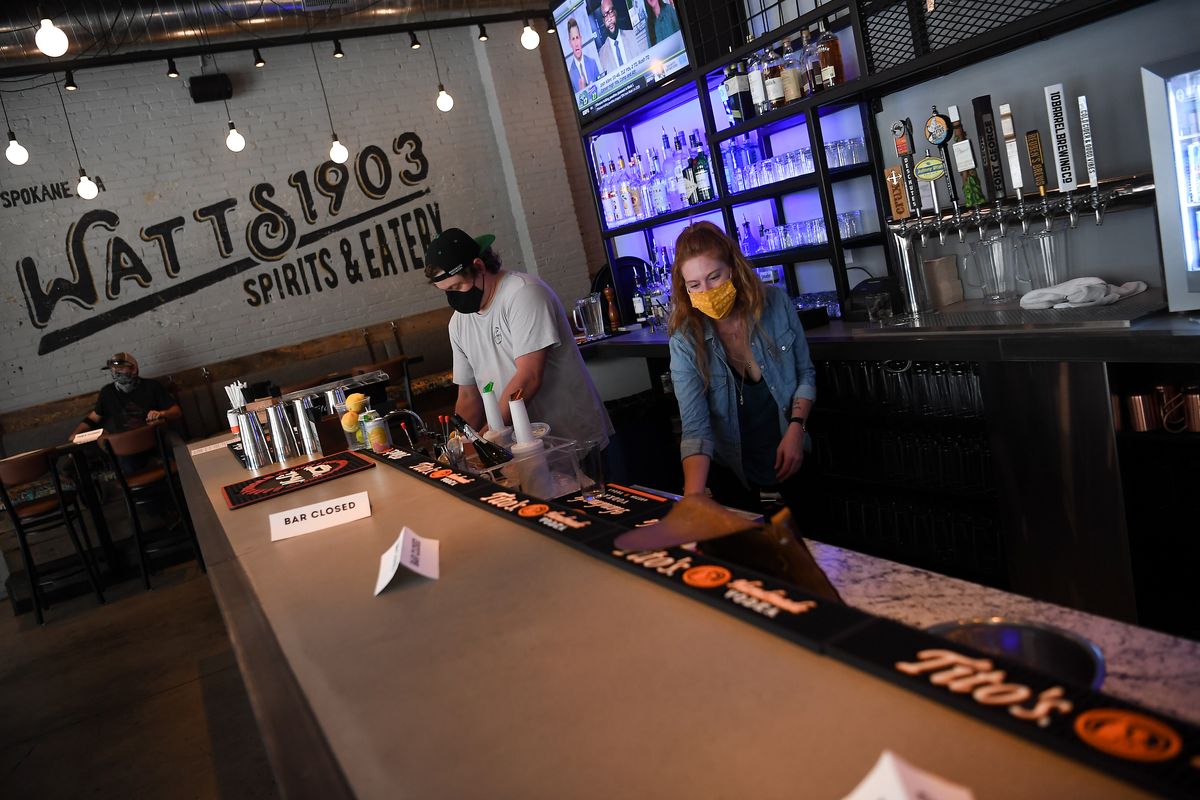Air quality remains hazardous with only slight improvement in Spokane
The statue of astronaut Michael Collins adjacent to the First Interstate Center for the Arts is seen on Sunday, Sept. 13, 2020 in downtown Spokane. The air quality was hazardous and hovered just below 500 at the time of this photo. (Libby Kamrowski/The Spokesman-Review)Buy a print of this photo
Hazardous smoky conditions continued to affect daily life Tuesday.
The 24-hour air quality index Monday was 406, the second highest on record.
The index number was lower Tuesday but continued to hover in the lower 300s throughout the day, including 312 at sunset. That’s still considered hazardous.
The daily index entered the hazardous category on Saturday for the first time on record and set the record on Sunday with a reading of 479.
The air quality index is measured on a 0 to 500 scale with anything above 100 being unhealthy for some high-risk groups. Prior to this weekend, the highest 24-hour AQI recorded was 257 in August 2018, also due to wildfire smoke.
Hourly readings, however, have fallen below 400.
As of 10 a.m. Tuesday, the hourly air quality index reading was 322, according to the Spokane Regional Clean Air Agency.
Meteorologists forecast smoke to continue impact health until the weekend when a new weather system is expected bring precipitation.

For restaurants like Watts 1903, COVID-19 restrictions mixed with hazardous smoky conditions are affecting business.
“We’ve definitely seen a little decline in business just with not having the outdoor seating,” manager Kelsey Strom said. “For now, we’re kind of relying on our regulars to keep us afloat this week.”
Watts 1903 opened in February just weeks before COVID-19 shut down in-person dining. The restaurant reopened indoor dining at 50% capacity along with its eight outdoor tables. Then it partnered with its neighbor, Brick West Brewing, providing it with 25 to 30 outdoor seats.
“We were on a steady upstream and we were finally starting to get business with the patio open there and then it took a drastic downturn,” Strom said. “It was a little bit disappointing.”
The restaurant closed all outdoor seating this week and plans to keep the patio closed until air quality improves.
“Really, right now it’s about filling all the seats that we can even though we’re at limited capacity,” Strom said.
Garbage collection in the city of Spokane was affected again Tuesday, as the city worked to use automated trucks rather than having employees spend time outdoors.
Customers who were missed on Monday were asked to keep their garbage cans out for pickup throughout Tuesday, according to a news release from the City of Spokane’s Public Works and Utilities department.
People downtown who receive garbage pickup during the night shift were asked to put their cans out a day late all week.
Pack-out services and collection of extra bags of garbage were suspended.
The city restricts strenuous outdoor work as much as possible when the air quality is hazardous, according to the news release.
Not everyone has the luxury of adapting their work environment.
TJ Davis, manager of Spokane Quick Lube on Division, said he can’t close the doors, leaving employees exposed to hazardous smoke conditions. For the garage, closing large doors often indicates to customers they aren’t open.
“We are closed when the doors are closed,” Davis said. “Since we are a small locally owned family business, every car counts.”
Despite the smoky conditions, Davis said people are still bringing in their cars.
“We actually did more cars on a Monday than we normally do,” Davis said.
Wildfire smoke worsens health conditions like asthma, COPD and respiratory infections, among other conditions, according to the clean air agency.
The Spokane Fire Department has seen an increase in calls related to wildfire smoke exposure, Chief Brian Schaeffer said.
Many of the calls are due to complications from a pre-existing respiratory condition, Schaeffer said.
“One of our messages that we’ve been trying to get out from the very beginnings of this is to have people call 911 if they suspect somebody is at risk and are having minor symptoms, to let us evaluate them and intervene early,” Schaeffer said.
While many people may not know they can call 911 for smoke-related issues, Schaeffer said, being evaluated by a paramedic can save them from more significant issues.
“We’re going to evaluate them and give them the best medical advice and consult with a physician if necessary,” Schaeffer said.
“We would much rather see them healthy and in minor distress rather than in a life-threatening situation.”
When it comes to keeping his firefighters safe, Schaeffer said he has canceled outdoor training and maintenance activities.
“Unfortunately, the majority of our business is outside,” Schaeffer said. “We’re trying to do the best we can to limit that.”
Firefighters are making sure to stay hydrated and limiting their exposure as much as possible, Schaeffer said.
While N95 masks could help with filtration of small smoke particles, they are only used when firefighters and paramedics are with patients. Otherwise, paper masks are worn.
Experts encouraged people to stay inside and keep indoor air as clean as possible by keeping windows and doors closed.
A box fan can be modified with a furnace filter to help clean indoor air if a filtration system is not available, according to the Washington State Department of Ecology.

